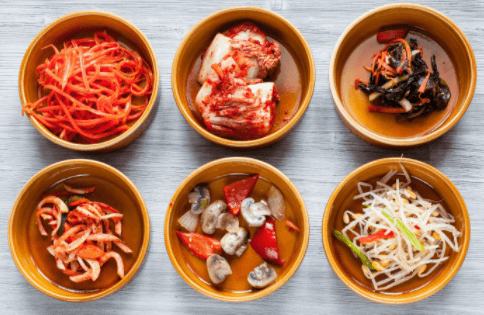Greek Food Culture: Our Top 10 Interesting Fun Facts
Discover the vibrant and flavorful world of Greek food culture in our top 10 fun facts.
From the origins of Greek cuisine to the modern culinary innovations, you’ll delve into the importance of olive oil, the influence of the Mediterranean diet, and the role of herbs and spices.
Explore the symbolism in Greek food and the traditional meze culture, as well as the impact of ancient Greek ingredients.
Get ready to tantalize your taste buds with these fascinating insights!
Origin of Greek Cuisine
The origin of Greek cuisine dates back to ancient times, with influences from Mediterranean and Middle Eastern food traditions. Greek culinary influence has historical roots, shaped by the agricultural practices and culinary traditions of the ancient Greeks.
The cuisine reflects a rich tapestry of flavors, often characterized by the use of olive oil, grains, fresh vegetables, and seafood. Historical food traditions such as the use of herbs like oregano, mint, and thyme, as well as the incorporation of yogurt and honey, have been passed down through generations, contributing to the unique and vibrant flavors of Greek cuisine.
The emphasis on fresh, locally sourced ingredients and the art of simplicity in cooking have been enduring hallmarks of Greek culinary culture, making it a beloved and influential culinary tradition worldwide.
Importance of Olive Oil
Olive oil is the cornerstone of Greek cuisine, adding a rich and distinct flavor to a variety of dishes. Not only does it enhance the taste of the food, but it also offers numerous health benefits, such as reducing the risk of heart disease and promoting overall well-being.
From drizzling over salads to being used in cooking, olive oil is a versatile and integral ingredient in Greek cooking.
Versatility in Greek Cuisine
When cooking in the Greek cuisine, you’ll find that olive oil serves as the foundation for a wide range of dishes, adding depth and richness to the flavors.
Greek food fusion has been influenced by a multitude of cultures, resulting in a diverse culinary landscape. This versatility is a testament to the adaptability of Greek culinary traditions, where olive oil isn’t just a cooking ingredient but a cultural symbol.
It’s used for sautéing vegetables, dressing salads, marinating meats, and even as a finishing touch to dishes.
The importance of olive oil in Greek cuisine goes beyond its culinary utility; it’s deeply rooted in the country’s history and has become an integral part of Greek identity.
Its unique taste and health benefits make it a staple in Greek households, showcasing the significance of olive oil in everyday Greek cooking.
Health Benefits and Uses
In Greek food culture, you can experience the importance of olive oil through its health benefits and versatile uses in everyday cooking. Olive oil isn’t just a staple in traditional Greek recipes; it also holds significant health benefits and cultural significance.
Here are some interesting facts about the uses and benefits of olive oil:
- Uses of olive oil: It’s not only used for cooking and dressing salads but also as a dip for bread and as a key ingredient in sauces and marinades.
- Health benefits: Olive oil is rich in monounsaturated fats and antioxidants, which are known to promote heart health and reduce the risk of chronic diseases.
- Cultural significance: Olive oil has been a fundamental part of Greek culture for centuries, symbolizing purity, health, and prosperity.
- Traditional recipes: It’s a key ingredient in iconic Greek dishes like moussaka, Greek salad, and souvlaki, adding a distinct flavor and richness to these culinary delights.
Mediterranean Diet Influence
The Mediterranean diet has had a profound influence on Greek food culture, shaping the way Greeks eat and cook. This diet is celebrated for its numerous health benefits, from promoting heart health to reducing the risk of chronic diseases.
Traditional Greek ingredients like olive oil, fresh vegetables, and lean proteins are key components of this renowned diet, making Greek cuisine a delicious and healthy choice.
Health Benefits of Mediterranean Diet
Discover 5 key health benefits of the Mediterranean diet and how it can positively impact your overall well-being.
- Heart Health: The Mediterranean diet is rich in heart-healthy fats, such as olive oil and nuts, which can lower the risk of heart disease.
- Weight Management: With an emphasis on fresh fruits, vegetables, and lean proteins, this diet can help you maintain a healthy weight.
- Brain Function: The abundance of omega-3 fatty acids from fish in this diet may support cognitive function and reduce the risk of cognitive decline.
- Longevity: Studies suggest that adhering to the Mediterranean diet is linked to a longer lifespan and reduced risk of chronic diseases.
Embracing the Mediterranean diet not only offers these health benefits but also reflects the cultural significance of savoring fresh, flavorful foods enjoyed in the company of family and friends.
Traditional Greek Ingredients
How can you incorporate traditional Greek ingredients into your diet to embrace the influence of the Mediterranean diet?
Greek food ingredients are characterized by the use of fresh, local produce such as olive oil, feta cheese, yogurt, honey, and a variety of fruits and vegetables. These ingredients are integral to traditional dishes like moussaka, souvlaki, and Greek salads.
The culinary history and traditions of Greece have heavily influenced the Mediterranean diet, emphasizing cooking techniques such as grilling, roasting, and using herbs like oregano, mint, and dill for flavor.
Beyond nourishment, Greek food holds cultural significance and food symbolism, reflecting the country’s rich heritage.
Role of Herbs and Spices
In Greek cuisine, using a variety of herbs and spices is essential to creating flavorful and aromatic dishes that will elevate your culinary experience. Herbs and spices aren’t only used for flavor enhancement but also for their potential herbal remedies. Here’s how these ingredients play a crucial role in Greek food culture:
- Mediterranean Flavors: Greek cuisine often features the distinct flavors of herbs like oregano, mint, and thyme, adding a refreshing and earthy taste to dishes.
- Health Benefits: Many Greek herbs and spices are known for their health benefits, such as the anti-inflammatory properties of oregano and the digestive benefits of mint.
- Culinary Versatility: From the warm notes of cinnamon in savory meat dishes to the fresh zing of dill in seafood, Greek herbs and spices offer a wide range of culinary applications.
- Cultural Significance: Herbs and spices are deeply intertwined with Greek culture, reflecting the country’s rich history and connection to the land.
Symbolism in Greek Food
You’ll find symbolism within Greek food through the use of ingredients and culinary traditions. Many Greek dishes aren’t just a combination of flavors but also carry cultural significance.
For example, the use of ingredients like olives and olive oil symbolizes peace and purity in Greek culture. The use of honey in desserts represents fertility and prosperity. Even the act of breaking bread holds symbolic importance, representing the sharing of food and camaraderie.
Additionally, traditional Greek dishes often hold historical and cultural significance, such as the significance of lamb in Easter dishes, symbolizing sacrifice and rebirth.
Regional Diversity in Dishes
Explore the diverse regional dishes of Greece and their unique flavors, each reflecting the distinct culinary traditions of its respective area.
From the mountains to the coast, Greece offers a wide array of regional specialties, each with its own story and flavor profile.
Here are some examples of the culinary diversity you can expect to find:
- Crete: Indulge in the hearty and flavorful Cretan cuisine, known for its generous use of olive oil, fragrant herbs, and locally grown produce.
- Peloponnese: Delight in the rich and tender slow-cooked dishes, such as stifado (beef stew) and kokkinisto (braised meat in tomato sauce), showcasing the region’s love for robust flavors.
- Aegean Islands: Savor the fresh seafood and bright, zesty flavors that define the coastal cuisine of the Aegean islands, where the sea influences every aspect of the culinary experience.
- Macedonia: Explore the bold and aromatic dishes influenced by both Balkan and Mediterranean flavors, featuring a delightful mix of spices and herbs.
Greece’s regional diversity offers a culinary adventure that celebrates the country’s rich history and varied landscapes.
Traditional Greek Meze Culture
Continuing from the previous subtopic’s discussion of regional diversity in dishes, delve into the traditional Greek meze culture and its significance in celebrating the country’s culinary heritage.
Greek meze traditions play a central role in social gatherings, where friends and family come together to share small dishes and enjoy each other’s company. These small plates of food are more than just appetizers; they are a way of life, representing the warmth and generosity of Greek hospitality.
The cultural significance of meze lies in the communal experience it fosters, encouraging conversation, laughter, and a sense of togetherness. Below is a visual representation of some popular Greek meze dishes:
| Meze Dish | Description | Region |
| Tzatziki | Yogurt and cucumber dip with garlic and herbs | Throughout Greece |
| Spanakopita | Spinach and feta cheese wrapped in flaky pastry | Mainland Greece and the islands |
| Dolmades | Grape leaves stuffed with rice and herbs | Peloponnese and Ionian Islands |
| Keftedes | Greek-style meatballs | Crete and Northern Greece |
These dishes showcase the diverse flavors and ingredients that make Greek meze an integral part of the country’s culinary identity.
Influence of Ancient Greek Ingredients
Ancient Greek ingredients have significantly shaped the rich and diverse flavors found in traditional Greek cuisine. These ancient flavors continue to play a crucial role in the culinary heritage of Greece, adding depth and authenticity to its dishes.
Here are some key influences of ancient Greek ingredients:
- Olives: Used in various forms, from olive oil to whole olives, these fruits are a staple in Greek cooking, providing a distinct and robust flavor to many dishes.
- Honey: The Greeks revered honey as a gift from the gods and used it in both savory and sweet dishes, adding a unique sweetness and depth of flavor.
- Herbs: Ancient Greeks cultivated a variety of herbs like oregano, mint, and thyme, which are still widely used today, infusing dishes with aromatic and earthy notes.
- Wine: With a winemaking tradition dating back to ancient times, Greek wine continues to be an integral part of Greek cuisine, offering rich and complex flavors.
Festivals and Celebrations
Get ready to explore the vibrant world of Greek festival traditions, celebratory rituals, and customs.
From religious festivals to local celebrations, Greece is known for its rich and diverse festival culture.
Discover the unique customs and traditional practices that make Greek festivals and celebrations truly special.
Greek Festival Traditions
Greek Festival Traditions are an essential part of our culture, and you’ll find them filled with vibrant celebrations and rich historical significance. These traditions showcase the heart of Greek cultural heritage and provide a delightful experience for locals and visitors alike.
Some of the most cherished festival traditions include:
- Delicious Festival Foods: Indulge in mouthwatering delicacies like souvlaki, moussaka, and baklava, which are an integral part of Greek festival celebrations.
- Lively Dances and Music: Enjoy traditional Greek music and folk dances like the syrtaki and kalamatianos that bring joy and liveliness to the festivals.
- Religious Ceremonies: Witness age-old religious rituals and processions that honor the traditions and beliefs of the Greek Orthodox Church.
- Colorful Parades: Experience the spectacle of vibrant parades, often featuring traditional costumes and floats, showcasing the pride and unity of Greek communities.
These festival traditions truly encapsulate the essence of Greek culture and are a must-experience for anyone seeking an authentic taste of Greece.
Celebratory Rituals and Customs
After indulging in mouthwatering delicacies and enjoying lively dances and music at Greek festival traditions, you’ll find that celebratory rituals and customs play a significant role in the vibrant fabric of Greek cultural heritage.
One of the most intriguing aspects is the celebratory feasting, where family and friends come together to enjoy an array of traditional dishes such as souvlaki, moussaka, and baklava. These feasts symbolize unity and joy, reflecting the importance of togetherness in Greek culture.
The cultural significance of these celebrations is profound, as they often honor religious events or historical milestones, connecting the present to the past. These customs are a testament to the rich traditions and values that have been passed down through generations, fostering a sense of community and belonging.
| Celebratory Rituals and Customs |
| Feasting |
| Significance |
| Community |
Modern Greek Culinary Innovations
Explore how modern Greek chefs have revolutionized traditional recipes to create innovative and exciting culinary experiences. Through culinary fusion and the application of modern techniques, Greek cuisine has seen a renaissance that delights food enthusiasts worldwide.
Here are some modern Greek culinary innovations that have been making waves:
- Molecular Gastronomy: Greek chefs are incorporating scientific principles to create visually stunning and inventive dishes.
- Farm-to-Table Movement: Embracing the concept of using locally sourced, fresh ingredients to elevate traditional Greek dishes.
- Global Influences: Drawing inspiration from international cuisines to infuse new flavors and techniques into classic Greek recipes.
- Creative Desserts: Experimenting with unique flavor combinations and artistic presentations to reinvent traditional Greek sweets.
The innovative spirit of Greek chefs continues to push the boundaries of traditional Greek cuisine, offering a delightful blend of the old and the new.
Frequently Asked Questions
How Has Greek Food Culture Been Influenced by Other Mediterranean Cuisines?
Mediterranean influences have greatly shaped Greek food culture. Culinary fusion with neighboring cuisines, like Italian and Turkish, has enriched traditional dishes. The exchange of ingredients and cooking techniques has created a diverse and flavorful cuisine.
What Are Some Common Ingredients Used in Traditional Greek Meze Dishes?
Common ingredients in traditional Greek meze dishes include olives, feta cheese, tomatoes, and olive oil. These ingredients are essential to the rich, traditional flavors of Greek cuisine and are used in various culinary techniques.
How Do Greeks Incorporate Symbolism Into Their Food and Dining Traditions?
In Greek food culture, symbolism in recipes and dining rituals is prevalent. Foods like pomegranates symbolize fertility, and bread symbolizes hospitality. Dining rituals, like breaking bread, represent unity and friendship, adding depth to the culinary experience.
What Are Some Modern Culinary Innovations That Have Impacted Greek Cuisine?
Modern techniques like sous-vide cooking and molecular gastronomy have influenced Greek cuisine, leading to fusion dishes. Innovative ingredients, like truffle oil and exotic spices, are incorporated, keeping up with culinary trends and creating a diverse food culture.
Are There Any Unique Festivals or Celebrations in Greece That Revolve Around Food and Culinary Traditions?
Greek food festivals and culinary celebrations are a big part of Greek culture. Traditional food events like the Panigiri and Tsiknopempti showcase festive dining traditions with music, dancing, and of course, delicious Greek cuisine.






